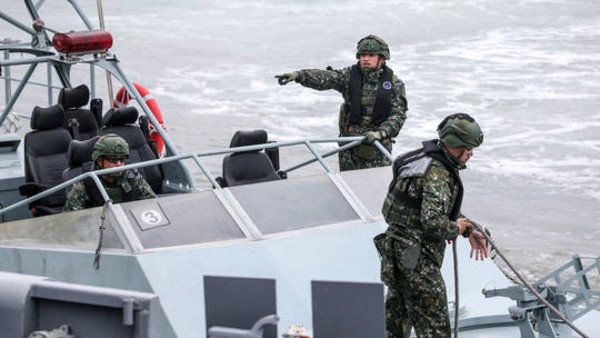Iran’s Plan to Strike Back Against the U.S.
Iran’s Military Preparations Following U.S. Attacks
Loading...

Beijing has signaled its readiness to go to war over Taiwan and is making secret preparations for that inevitable outcome.
Last week, William Lai was inaugurated as president of the self-governing island of Taiwan. Lai, a pro-independence hawk who supports formal separation from China, delivered a provocative speech reaffirming the sovereign existence of the wayward province.
China responded immediately by conducting military exercises around the island, which, in Beijing's own words, were exercises to "seize power" and establish an effective naval blockade. The exercises were probably planned in advance and would have taken place anyway, but they were still the largest and most significant exercises China has ever held, even larger in scale than the ones following Nancy Pelosi's controversial visit to the island in 2022.
In this sense, mainland China's official rhetoric against Taiwan has also become significantly more aggressive than ever before. A State Department spokesman said, "Taiwan independence forces will have their heads broken and bloodshed after colliding with the great current of China's complete unification." Of course, China has always made its position on unification with Taiwan clear and has never ruled out the use of force, but the issue has worsened in recent years as the United States deliberately stokes tensions with Taiwan to provoke China. The trend accelerated dramatically after the outbreak of the invasion of Taiwan and hostilities in Ukraine, including manipulating the international paradigm towards a conflict between authoritarianism and democracy.
But the question is: will China actually take this risk? This would be another critical moment in international relations that, unlike Ukraine, could actually lead to a direct war with the United States. Beijing has a lot to think about.
A decision to forcefully retake Taiwan would provoke a huge backlash from the West, which the United States would quickly use to reaffirm its solidarity with all its allies. This would initially include immediate decoupling measures that China has long opposed. This could include a total embargo on the sale of microchips and other critical technologies to China, an immediate ban on key Chinese products from all parties’ markets, possible seizure of China’s foreign assets, and a comprehensive censorship campaign that would include a blanket ban on TikTok and CCTV among others.
Politically, one would also expect the United States to change the rules of the game through the outcome of such a conflict, as it did with Ukraine and NATO allies. Perhaps the United States would openly abandon its “One China” policy and then reaffirm its recognition of Taiwanese independence as its own position, declaring that it would not recognize any annexation of Taiwan by China if it were successful. All this means that the political and economic costs of China engaging in such an effort would be enormous.
So the question is, to what extent would the benefits need to outweigh the costs for Beijing to finally decide to invade? In fact, China is strategically preparing for this scenario more than many think. First, a possible war scenario will be a determining factor in the direction the country's economy will take. China is pushing for the indigenization of chips, technology supply chains, and other necessities on an increasingly large scale, gradually reducing the need for imports from abroad.
For years, the United States has tried to use China's dependency on Taiwan for the semiconductor supply chain and large parts of that chain as a strategic bottleneck to paralyze China's economic and military development. The Chinese government is actively investing in and at the same time developing its own capabilities to break this constraint and break away from this dependency as soon as possible. Second, China has been preparing for many years for the possibility, however unlikely, that the United States might try to impose a comprehensive maritime embargo against China. The Department of Defense has been asked to prepare a study on how such an embargo would be possible. The aim, of course, would be to weaken China militarily by denying it access to foreign fuel supplies.
Here too, an attempt is being made to exploit China’s lack of energy independence, with its population size as a bottleneck. Beijing’s main response has been to build its Belt and Road Initiative and to use strategic partners such as Pakistan to create alternative sea and trade routes that would effectively bypass the country’s increasingly militarized naval areas. This also involves strengthening strategic and energy policy integration with Russia. Taking these things into context, China is certainly preparing for the eventuality of war and deciding on the economic adjustments that would be necessary in such a scenario. However, it is also true that Xi Jinping has not given up on diplomacy at this point, and although he remains interested in the country's economic development through integration with Western markets, it is unlikely that he will make such a far-reaching decision. However, it must be said honestly that with the changes in the world, this door is increasingly being closed. Also, given current developments, it is clear to most people that Taiwan has no interest at all in unification. so what options does China have vis-à-vis Taipei? It may be blamed for doing so, or it may be blamed for not doing so.
Iran’s Military Preparations Following U.S. Attacks
Troops remain in five strategic locations, raising fears of renewed tensions and long-term occupation.
Opposition forces have taken control of the capital after a significant offensive. Here is how it unravelled.
